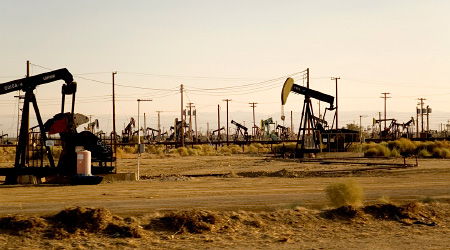The Risks of Crude Oil Futures Trading

Investors trade crude oil futures on a daily basis, and some of them make a fortune doing it. However, oil futures trading isn't for everyone; it does involve a high level of risk, and for everyone who makes a dollar in oil futures trading, someone else loses one.
Global oil consumption points to increased demand, so oil futures seem secure.
The premise behind oil futures trading is that the price of oil rises as demand increases, so predictions of high demand makes many investors feel secure in oil futures trading. Unfortunately, though, high demand doesn't indicate that demand is going to stay high, and even if prices increase, investors can't really know how quickly prices are going to rise. If you buy oil futures for $200 a barrel in a year, and prices only reach $180 by the time the instrument reaches maturity, you'll be losing money.
The oil futures market is extremely volatile, and influenced by many factors.
Investors want to make money by trading oil futures. If an oil refinery goes offline and supply is expected to drop, many investors would immediately snatch up oil futures with the expectation that prices are going to rise with decreased supply. What happens if the oil refinery comes back online quickly? The increase in the price of oil may never come, and the only activity is a spike in the oil futures market. Then you'd potentially be stuck with oil futures at a high price, while the price of oil remains low.
Demand for oil futures can be extremely difficult to predict.
Analysts almost universally predict demand for oil to go up. Oil has many applications, and as demand increases, prices generally go up. Unfortunately, demand for oil can be extremely difficult to predict. As the price of oil increases, it places more of a burden on consumers. Eventually, the price of oil and the general state of the economy is enough to make many consumers reduce oil consumption, resulting in a drop in demand. Less demand means the price of oil drops, and people who invest in oil futures at a certain price could end up paying too much.
Global oil production plays a big part in oil futures.
OPEC is a huge driving factor in the price of oil futures. As OPEC raises oil prices, prices increase across the board, making oil futures seem profitable as investors predict how high the price of oil is going to increase. Unfortunately, though, foreign policy can have a big impact on oil prices, and investors can do very little about this aspect of oil trading.
While OPEC carefully regulates oil production to keep the oil market steady, fluctuations in the market can cause drastic changes in the price of oil, therefore making oil futures extremely risky. War or civil unrest can decrease oil production, increasing demand and sending prices skyrocketing, but producing too much oil can drop prices, resulting in a big loss for oil futures traders.
Elsewhere on StockMonkeys.com







